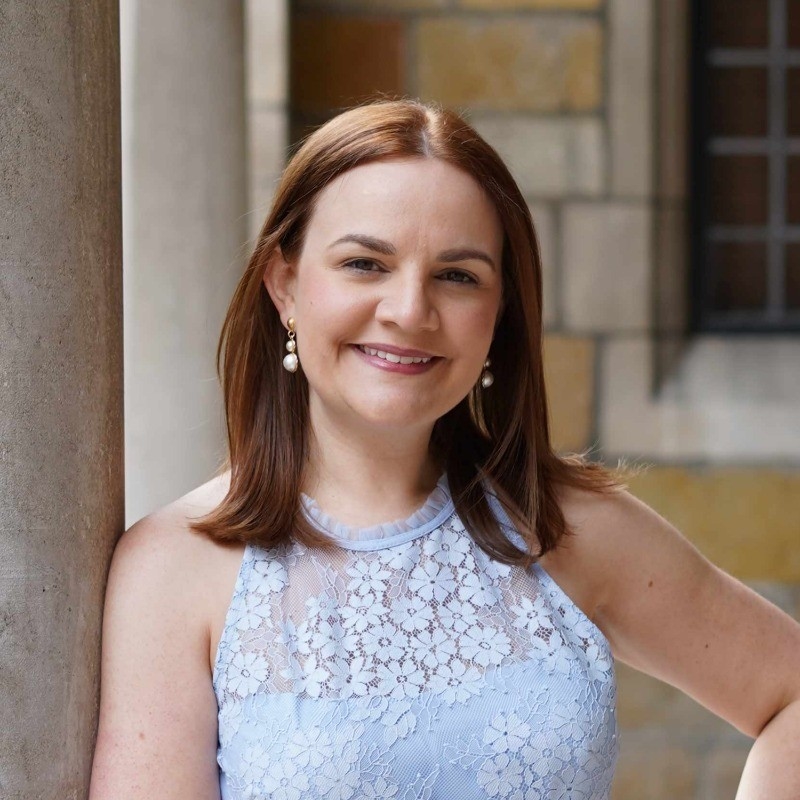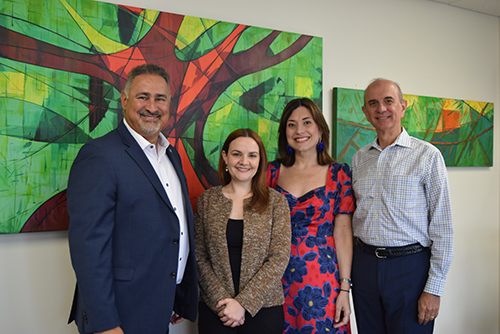SPOTLIGHT: Gabriela Alvarez (MBA ’23)

SPOTLIGHT: Gabriela Alvarez (MBA ’23)
It’s only been a year since Gabriela Alvarez (MBA ’23) graduated from Michigan Ross, but already she is making social impact waves as a Senior Strategy Consultant at Accenture in Chicago. While at Ross, she not only got a certificate in Diversity, Equity & Inclusion and took social impact courses, but took part in our Nonprofit Board Fellows Program. We caught up with her soon after she joined the Board of Directors of Grupo Guayacán, a nonprofit dedicated to education and entrepreneurship activities in Puerto Rico, and a pivotal player in her career and life story.
What are the challenges and advantages of doing social impact work within a large consultancy that covers more than social impact?
Starting with my internship and since coming back full-time to Accenture after graduation, I’ve had the privilege of working on three social impact projects across a variety of focus areas. Doing this type of work within a large organization like Accenture — we have over 700K employees! — certainly comes with its own unique advantages and challenges. On the plus side, it’s amazing to see the broad global reach of the firm which allows us to work with clients who are tackling some of the most challenging problems around the world. It also means we can tap into an amazing network of resources, talent, and expertise that span many different functions, delivering value across strategy, innovation, digital transformation, and now AI. It’s been very interesting to watch how these resources can be leveraged to scale impact for nonprofit and social impact organizations. The social impact practice, called Accenture Development Partnerships, is a wonderful community with deep subject matter expertise and relationships in the sector. However, it is relatively small within the scope of the organization, which means there are always opportunities to build greater awareness and visibility and to strengthen connections with the commercial side of the firm. Some of the most interesting work I’ve had the chance to learn about lies right at the intersection of business and impact, and I look forward to doing more of that in the future.
In your work with nonprofits, what are the biggest challenges they are facing in a post-pandemic world?
The pandemic brought on a dramatic shift for nonprofit organizations, impacting every aspect from programs to operations and fundraising. As a former nonprofit fundraiser for many years, I can attest to the fact that the pandemic resulted in a huge influx of funds for many nonprofits. Once those funding opportunities dried up, organizations were left having to re-evaluate their development strategies to close the gap. For many, this has meant the need to diversify their donor base, establish new relationships, and think strategically about partnerships and funder engagement.
Another significant challenge is the increased need and urgency for digital transformation. While many organizations had to abruptly go virtual during the pandemic, our new reality requires leaders to think strategically about transforming their organizations’ digital infrastructure and data gathering & analysis capabilities. This brings up a whole host of challenges from getting the strategy right, to securing the funding and talent to execute on it.
Lastly, I think the pandemic required organizations to respond in a way that was previously unimaginable and that many were not prepared for. Going forward, there is a great need for organizations to emphasize crisis-proofing, thinking about risk management and resilience as critical parts of their organizational health. In sum, the post-pandemic world has resulted in significant and accelerated changes for nonprofit organizations. Getting smart on how to actually be good at change, and leveraging change management frameworks and practices is something that all organizations can benefit from. Supporting organizations on this change journey has been one of my favorite things about my time at Accenture so far.
Describe your metaverse work and ways in which it could positively impact specific communities.
During my time at Accenture, I’ve been lucky to gain exposure to some of our work around cutting-edge technologies like virtual and extended reality. This has opened my eyes to the ways that these technologies can have a positive impact on underserved communities and populations. In the case of the neurodivergent and disability communities, extended reality platforms can be very powerful in breaking down barriers, and allowing individuals to explore whole new worlds and experiences. Leveraging augmented and virtual reality technologies can provide a way to engage, communicate, and build relationships in a new and highly immersive way. This allows for experiences that may not be feasible or safe in the real world for individuals with disabilities. Through these advancements, we can also provide highly personalized experiences, tailored to their unique needs, for example, leveraging sensory enhancements as part of rehabilitation or learning programs. I’m excited to see how these technologies continue to evolve and how different applications and approaches can make a difference in underserved communities and the lives of the neurodivergent and disability communities.
What was the biggest learning you’ve taken from your Board Fellows and other experiences at Ross into the working world?
I was fortunate to have several impactful experiences while at Ross that really made a mark as I went back to my career post-MBA. One of these experiences was my participation in the Board Fellows program, where I had the opportunity to serve as a member of the Board of Directors at the Ann Arbor Center for Independent Living, a local disability advocacy and support organization. Not only did I learn so much about disability and independent living empowerment, but I also gained my first experience working with a nonprofit organization from the perspective of a board member. The Board Fellows program was a great opportunity and one of my most treasured experiences at Ross. I’m excited to say that recently I was named to serve on the board of the nonprofit organization where I worked for many years before Ross, accomplishing one of the goals I set forth during my time at school and providing me with a new platform to continue contributing to Puerto Rico from the diaspora.

Gabriela alongside the Executive Director and other board members of Grupo Guayacán on the first day she joined the Board.
What would you recommend to current and future Ross students who are interested in the social impact sector?
Ross is an exceptional place to explore social impact, specifically how it intersects with the business world. In addition to Board Fellows, which I think is a must-do, I would encourage students to think about both academic and action-based learning opportunities that may complement their experience. On the academic front, I always looked forward to the list of social impact courses shared by the B+I team at the beginning of registration for each term. Not only did this help me find some of my favorite classes at Ross (Social Intrapreneurship and Equity Analytics to name only a couple!) but it also included courses at other Michigan graduate schools. This is a unique opportunity to deepen and broaden your academic experience by venturing beyond the walls of the business school and one I wish I had leveraged more.
From an action-based learning perspective, there’s an ever-growing number of social impact and sustainability-focused projects available during MAP (Multidisciplinary Action Projects). This is a wonderful opportunity to get some real-world experience in these areas while building the skills that will help you be successful during the summer internship and beyond. For those interested in the financial aspect of social impact, there are also student-led funds where you can learn hands-on about what it takes to invest with an impact lens. All in all, there are so many ways to learn about and engage with social impact work – it’s choosing where to focus your (limited) time and energy that may be the challenge!

